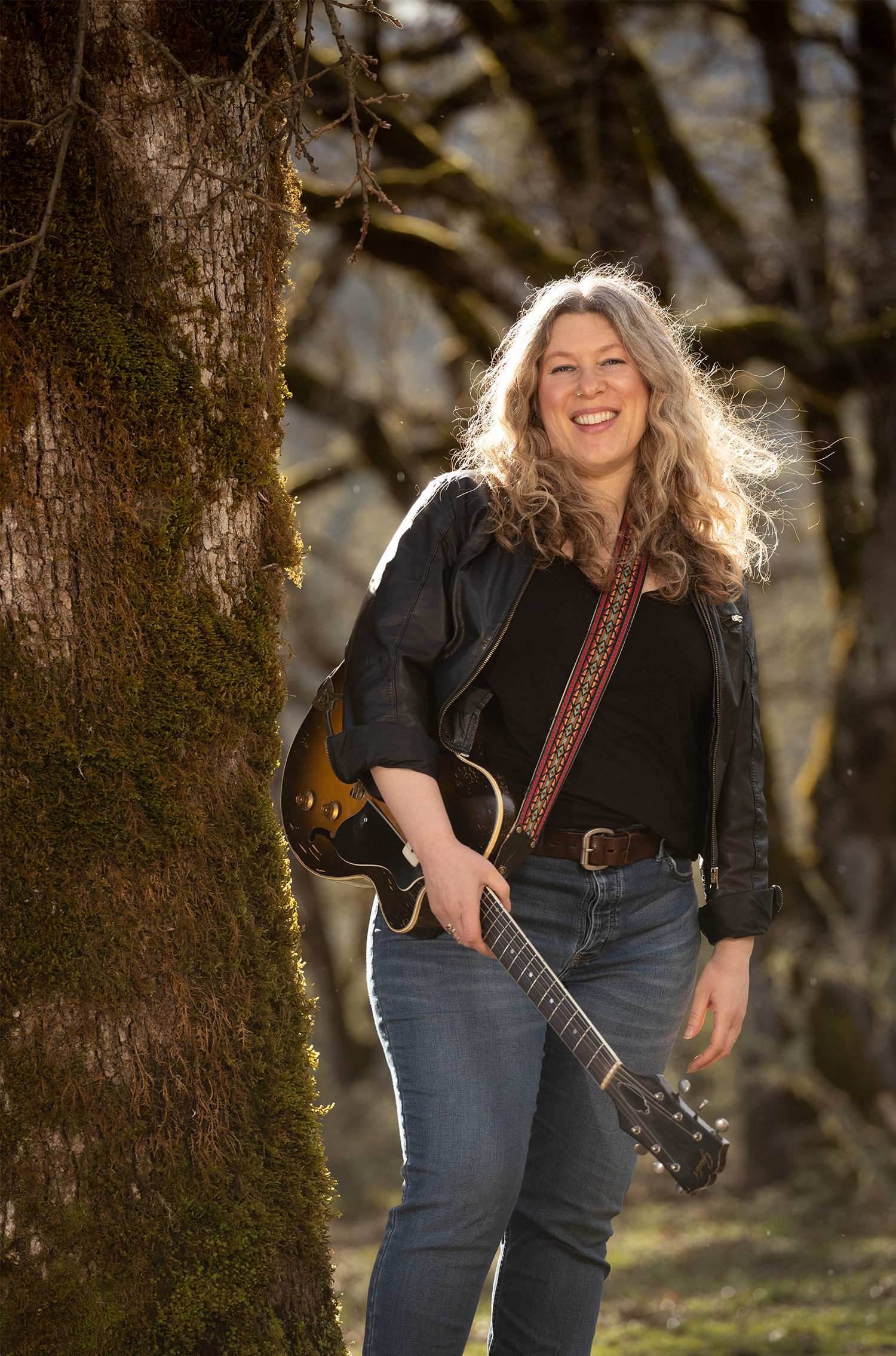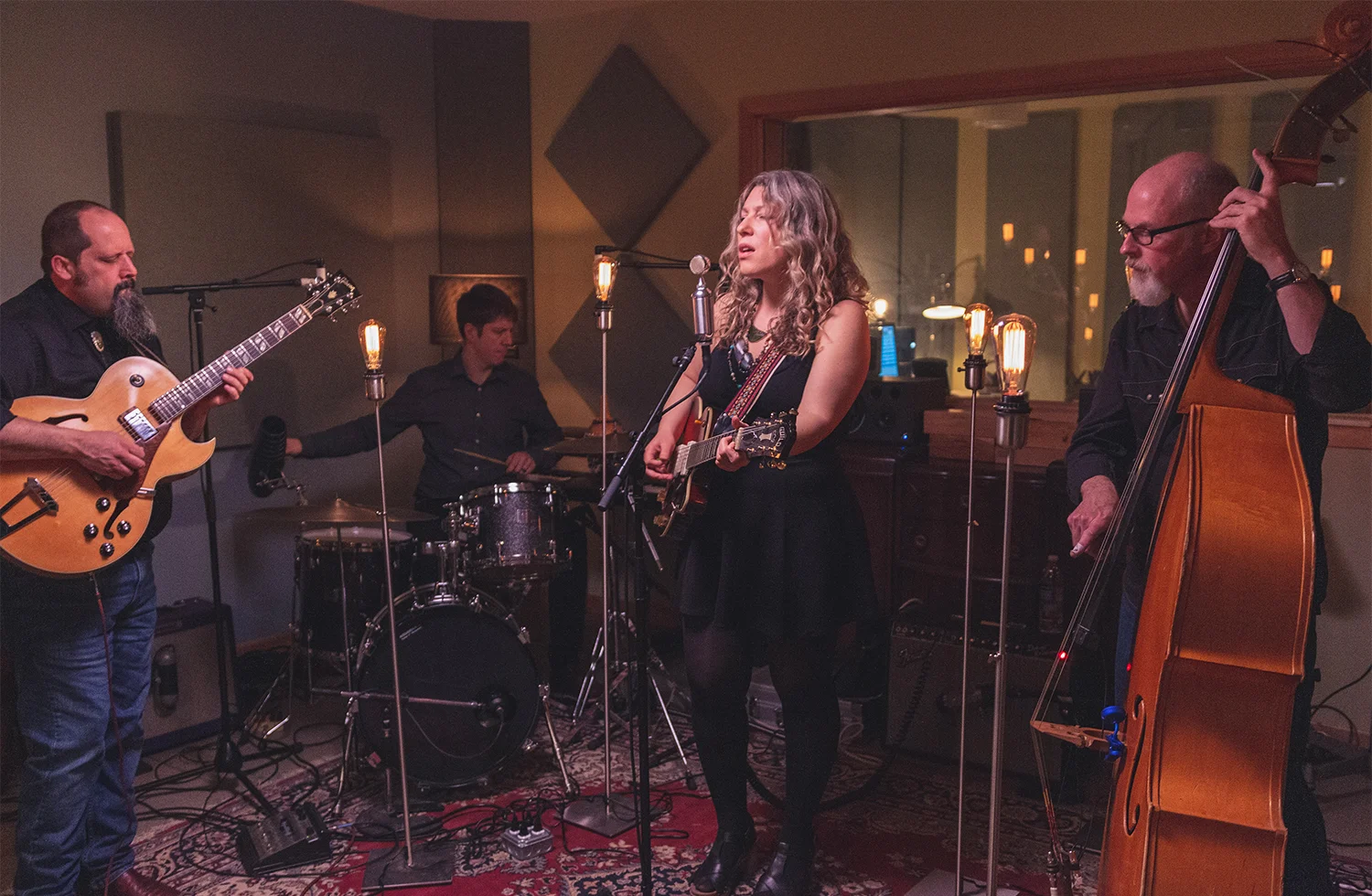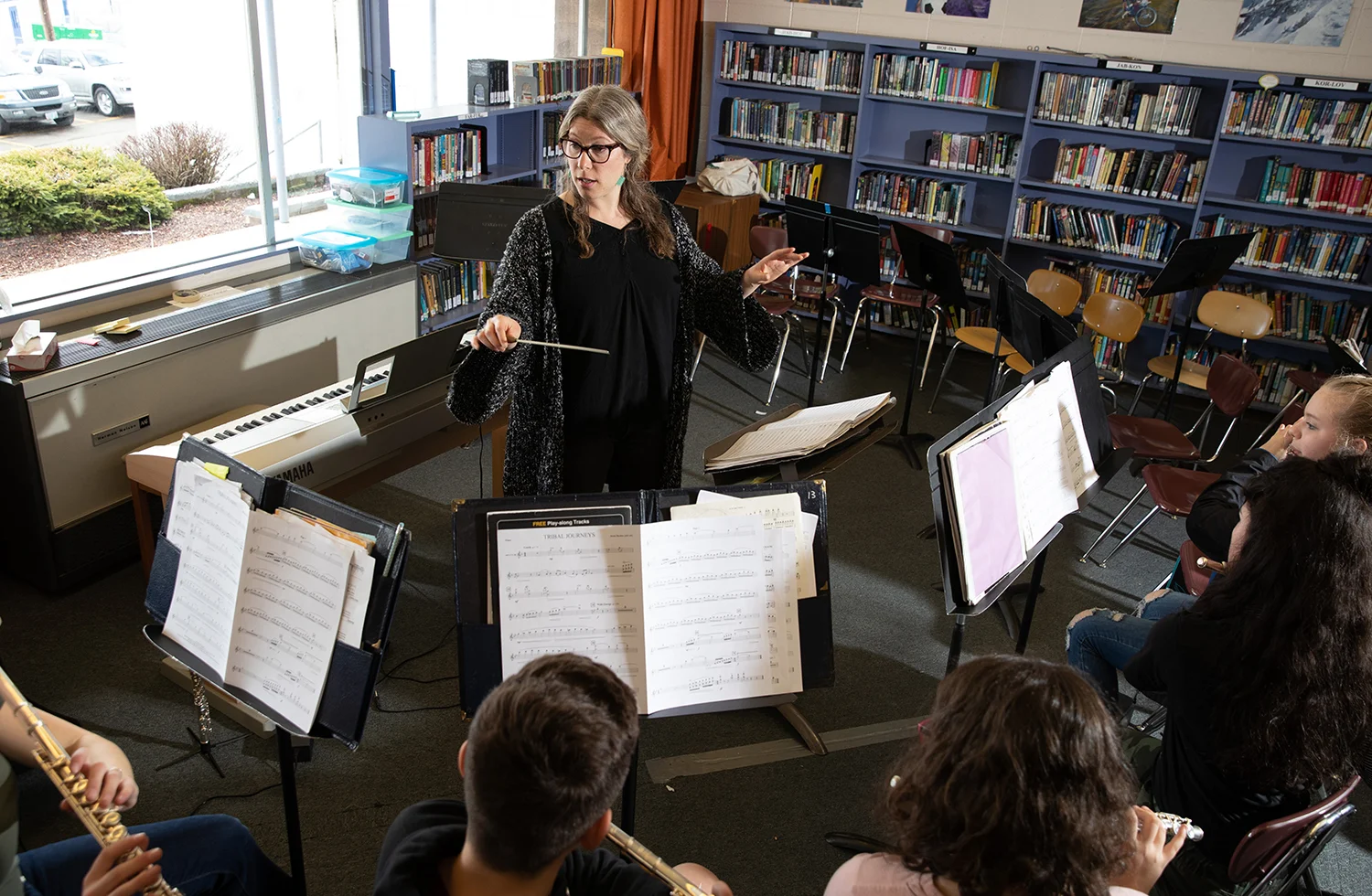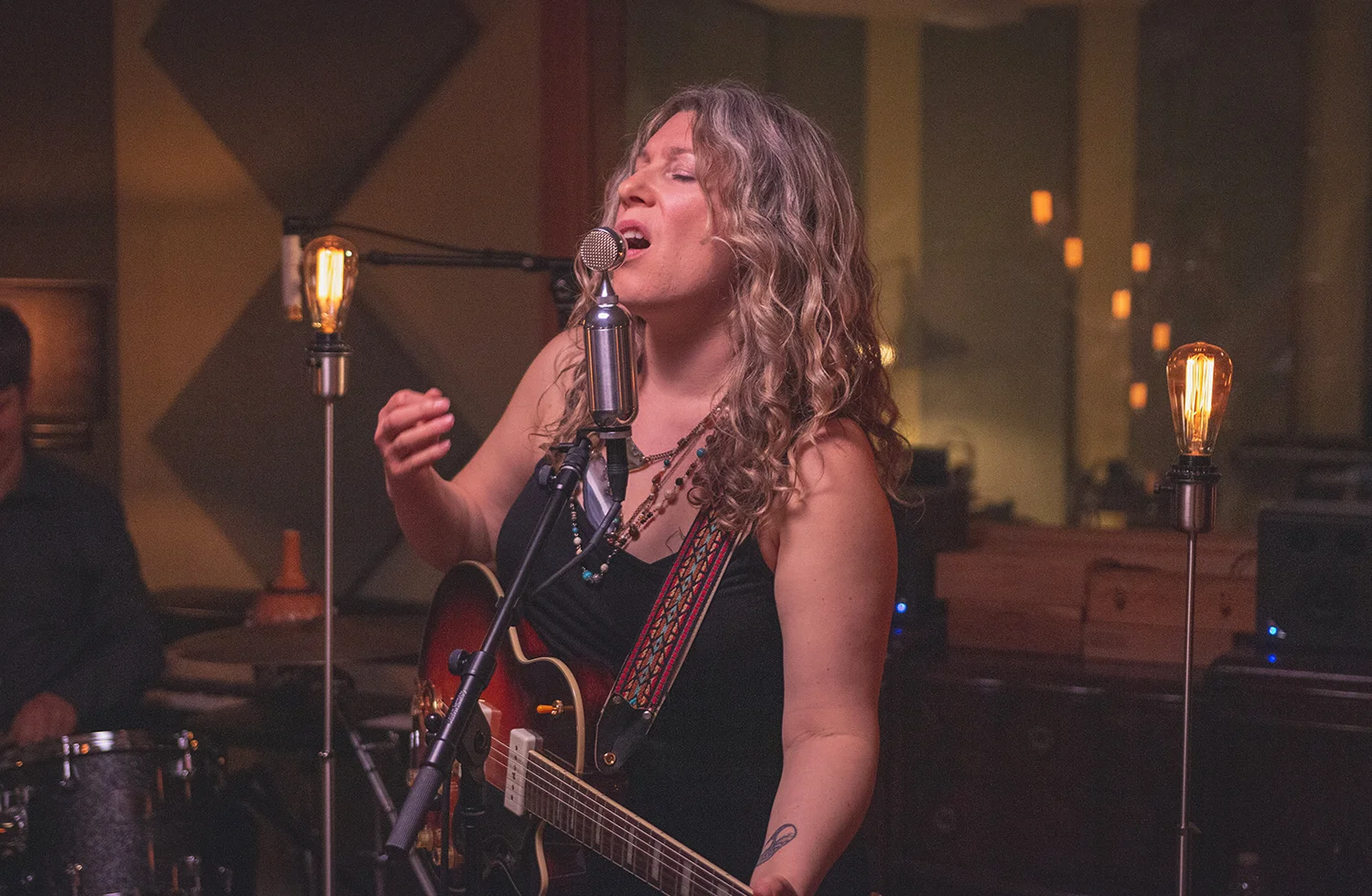Doo Wop Teacher

By day, she’s an award-winning teacher in Sutherlin. After hours, she’s a critic-pleasing recording artist.
Story by Dick Baltus Photos by Thomas Boyd
The guitar rests in a stand, framed by the picture window in Melissa Ruth’s living room in the far western reaches of rural Sutherlin. As guitars go, the electric 1958 Guild, its sunburst finish dulled from the years and the use, is fairly inconspicuous, like a musician’s version of a potted plant.
Truth be told, while the vintage six-string has its classic curves and charm, it didn’t even catch Ruth’s eye that day, 10-plus years ago, when she ambled through McKenzie River Music in Eugene. For one, she was there shopping for a non-electrified model, the better instrument to accompany the “folky, acoustic stuff” she was into at the time.
For another…well, there isn’t another, just as there’s been no other guitar for Ruth since a store employee pointed to the Guild and said, “Try this one.”
Melissa Ruth performing with the Likely Stories. Photo courtesy of Matt Greco, The Rye Room.
Melissa and her music students.
Ruth had been writing and performing songs long before that day. But it wasn’t until she found her ’58 that she truly found her voice. It may not have caught her eye initially, but it immediately captured her soul.
Not everyone knows her as Melissa Ruth. To the students and faculty of Sutherlin High School, where since 2015 she has led the music program, she’s Melissa Jmaeff. Many of them don’t have a clue that Jmaeff’s alter ego already has three albums to her credit (four, actually, but she doesn’t really count the first) and thousands of miles of road work in her rearview mirror.
“I’m sort of a Jekyll and Hyde,” she says. “I keep my Melissa Ruth identity kind of hidden at school. When I’m in the classroom, it is so not about me. It almost feels uncomfortable to talk about Melissa Ruth.”
Others don’t have the same problem talking about her, regardless of the name she might be using at the time. As Jmaeff, she earned the Sutherlin Chamber of Commerce’s Outstanding Educator award last winter for her efforts turning the middle and high school’s half-time, band-less music program into a full-time department with 98 band students and three choir classes.
As Ruth, her albums have earned high praise from one of the loudest, and notoriously hard-to-please, critics in the Americana music category that most closely — but far from perfectly — defines her style.
Putting labels on music is a tricky, and to a large extent pointless, exercise. But you’ve got to call your music something besides music, so Ruth calls hers “doo-wop twang.” If that’s not helpful, you may not find any more illumination in the deeper dive she takes trying to define it.
“In my promotional materials, I describe it as the space of blues, the teeth of country and the grit of rock and roll,” Ruth says. “There’s a lot of overlapping genres, obviously. But blues people think it’s too rock, rock people think it’s too country and country people think it’s too blues. Whatever you hear in it, it’s there.”
What you won’t hear much in the music of Melissa Ruth is the story of Melissa Jmaeff. “Not many of her songs are autobiographical,” says Johnny Leal who, as Ruth’s husband and musical collaborator, ought to know.
So about that story. Ruth was born and raised through age 16 in an outpost in British Columbia so rural that her husband quips, “it’s best described as a feeling, not a town.”
Ruth and husband/guitarist Johnny Leal at home.
Her mother was a nurse, her dad a contractor who augmented his income by playing in a local bar band. “Dad would always say, ‘Rock and roll fed this family,’” Ruth remembers.
While her parents didn’t have much disposable income, they were supportive of Ruth’s desire to take piano lessons. They couldn’t afford a keyboard, though, so she was improvising from the jump.
“I would practice on paper that had piano keys printed on it,” she says. “I practiced that way for a good, long time.”
At 9, Ruth also started playing the flute; at 15, she added guitar.
During her junior year in high school, Ruth’s family relocated to San Bernardino, Calif. Then she graduated and headed back to Canada, enrolling in the University of Calgary. By now she was playing both guitar and classical flute, but pursuing her degree in the latter.
Before long, Ruth moved back to California, landing in Arcata, where she enrolled at Humboldt State University and met the guitarist of her dreams.
Johnny Leal had been playing guitar since he was a kid growing up in California. Along the way he met an older player named Hank Alrich, who had earlier made his mark as manager of the legendary Armadillo World Headquarters, putting Austin, Tex., on the international map for touring musicians.
“About age 15 I started going to Hank’s house and playing with him,” Leal recalls. “One day it would be Hank Williams, the next we’d be playing jazz.”
After a stint in junior college, Leal enrolled in the same Humboldt State music department as a classical flute major from Canada who had started writing songs and backing herself on guitar in gigs outside of school.
Leal and Ruth meet; they play together; it’s love at first sound.
“Johnny was the first person I had played with who was just, like, serving the song,” Ruth says. ”He wasn’t trying to fit my songs into his skill set, but trying to fit his skill set to the song. Right from the get-go I thought this would be a great person to collaborate with.”
Since all of Ruth’s formal training had been classical and on the flute, her songwriting and guitar playing all came from her gut, heart and ear.
“I only wanted to play what sounded good to my ear,” she says. “I didn’t play because someone told me to play it this way or because it was a one-four-five chord change. I would just start playing, and because Johnny knew music theory he was able join in and follow what might be one of my weird structures.”
Here, Leal chimes in. “She downplayed her songs when we first started playing together. But she always had super interesting stuff going rhythmically. Nothing was standard, but it wasn’t like something was wrong.”
Photo by Matt Greco.
After graduating, Ruth and Leal married and moved to Eugene in 2006. He had been hired by North Douglas School District to teach K-12 music in Drain; she got a job in Yoncalla, where she rejuvenated her first music program and taught for eight years before moving on to Sutherlin.
For a wedding present, their friend Alrich gave them the gift of recording time at his studio. Thus was born Melissa Ruth, recording artist.
She recorded her first album, the one she considers a trial run, and played her first public gigs with Leal while playing “second-rate,” hand-me-down instruments. The couple decided it was time for a trip to McKenzie River.
The Guild had been in the store for about three years when Ruth picked it up, and it would be there for another one, even after she finally let go of it that day.
“As soon as I played it I thought, ‘Oh no, this is the one,’” she says. “But I didn’t have the money, so I had to put it on layaway. Every extra dollar we had we’d send to McKenzie until they finally let me take it home.”
The guitar, Ruth says, “had a voice of its own, and it had its own songs. So I just started writing and within a couple months had enough material for the first real record I did.”
The self-produced “Ain’t No Whiskey,” was released in 2011, and Alrich thought highly enough of it to encourage Ruth to send it to an influential Austin music critic named John Conquest, who published a music magazine. By the time Ruth had researched Conquest — reading some of the most scathing reviews she’d ever run across — she had already sent him her album.
“I thought, Oh my God, who did I just send this to?” Ruth remembers, laughing.
Turns out, she had nothing to worry about. In his review, Conquest gave “Ain’t No Whiskey” 4.5 “flowers” out of a possible five, later naming it one of his favorite albums of the year and Ruth one of his female artists of year. An invitation to play Conquest’s showcase at Austin’s legendary SXSW music festival followed in 2012, the first of several performances Ruth has played during the event.
In the years since, Ruth has produced two more albums, “Riding Mercury” and “Meteor,” just released in March. She took a year off teaching at Yoncalla to tour in support of her second release.
While she does perform the occasional local gig, either with Leal as the Midnight Darlins or with an all-woman western band, Ruth’s performances are more often out of town. She’d love to play more locally, she says, but her music is more suited to listening to than partying with.
“Most of the local places are good-time spaces, which is great. I love going out and having a good time too. But our music can be a little on the bummer-jam side, so it takes some listening,” she says, laughing.
Bummer jam. Doo-wop twang. Blues space, country teeth, rock-and-roll grit. Maybe it just can’t be described, but if you hear Ruth’s music, you can certainly feel it. And you may also come to understand how a guitar can speak.
Albums are available on iTunes.









